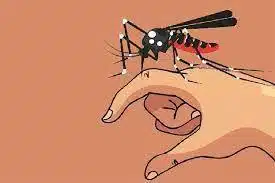As the winter season is approaching the cases of dengue are witnessing a soar in the capital city of the country, with 300 people being infected between November 1 to 4, crossing the margin of 2,400. According to The Logical Indian, the data has been shared in a report, released by Municipal Corporation of Delhi (MCD) on November 7, 2022.
Statistics show that nearly 1,300 cases were recorded in the month of October 2022. The report notes, to date, the capital city of Delhi has not recorded a single loss of life, where the previous year witnessed 23 deaths due to the disease.
The data of the report then informs that till October 26, there were a total of 2,175 dengue cases recorded, of which 26 people diagnosed in January, 16 in February, 22 in the month of March, in April – 20, 30 cases in May, 32 in June, 26 in July, and 75 in August. The highest infection rate was registered in the month of September with 693 people diagnosing the mosquito-borne tropical disease, the data further reveals.
Besides this, in Delhi this year, 200 people were diagnosed with Malaria, followed by forty infections of chikungunya. The report further enlightens that after 1996, 2015 was the year with a colossal number of 10,600 dengue infections recorded till October.
Kerala state recorded the highest death toll this year, which is 20, while witnessing more than 7,000 dengue cases. On the other hand, Uttar Pradesh recorded 18,000 dengue infections, since the beginning of 2022, which is highest of all. In Kolkata, so far, 5,428 people contracted dengue, higher than the numbers of 2019.
The numbers released by National Center for Vector-borne Diseases Control (NCVBDC), shows 60 fatalities related to dengue from 12 states of the country this year. In the year of 2016, Delhi reported 4,431 cases of dengue.
The Director General of Health, Uttar Pradesh, Lilly Singh, this week in conversation with ANI, speaking on the situation of the disease in the state, asserted, “Symptoms of Dengue are different from the typical Dengue symptoms but there is nothing to worry as the death rate is less. Symptoms like short-term fever, low platelet count, loss of fluids, and others”.

WHO: Climate Change leading cause of Dengue
The international organisation, in its recent statement, stated the environmental issue is leading to a hike in cholera and dengue cases.
“Climate Change is fueling cholera and dengue, and increasing the risks of new pathogens emerging. It exacerbates disease & malnutrition. Sick people are more likely to be malnourished, & malnourished people are more likely to get sick. The climate crisis is a health crisis”.
Common symptoms of Dengue
- Nausea, vomiting
- Rash
- Aches & pains, basically – eye pain, typically behind the eyes, muscle, joint, or bone pain
- Fever
- Severe stomach pain
- Swollen glands
- Headache.
Know more about disease
WHO stated some of the facts related to the disease, with the aim to increase awareness among the world population. These are:
- Dengue is transmitted through the bite of an infected Aedes mosquito. Dengue mosquitoes bite throughout the day, especially between 6-8 am and 4-6 pm.
- Dengue mosquitoes breed in water, including any water containers, like storage tanks, cisterns, coconut shells, flower pots, discarded cups and bottles.
- Dengue mosquito breeding sites by safely disposing of items, like, tyres, coconut shells, discarded cups and bottles that can collect water.
- Prevent mosquitoes from breeding by covering existing water containers including water tanks and buckets. These should be scrubbed clean at least every 7 days.
Protection against dengue
Simple measures can be taken by one individual to remain himself and his family members safe from the disease, which includes, applying mosquito repellent, wearing light-coloured, long-sleeved clothes, using screens on the windows and doors, sleeping inside mosquito net, utilising household insecticides, aerosols and mosquito coils.
Mamta Baneerjee’s plan to tackle dengue
The Chief Minister of West Bengal, has appointed 6 teams, which will act as coordinators between the health department and Bengal districts’ civic bodies.
As per The Telegraph online, one of the senior officials in the health department, noted, “The meeting led to a conclusion that special teams headed by the senior bureaucrats will be deployed for Kolkata, and other districts where dengue cases have increased alarmingly. The teams will intensify drives to destroy the – mosquito-breeding sites in coordination with the civic bodies. Door-to-door visits are also to be increased”.
read more : Increasing dengue outbreak, patients with high fever in hospitals













